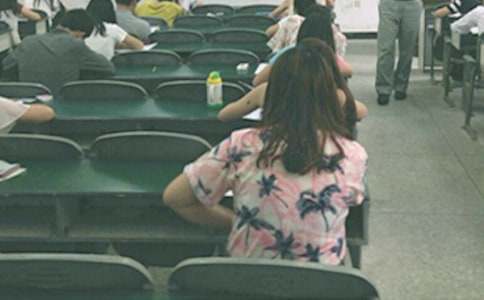- 相關(guān)推薦
12月英語(yǔ)六級(jí)聽(tīng)力考試長(zhǎng)對(duì)話訓(xùn)練
英語(yǔ)六級(jí)聽(tīng)力最主要的是拼實(shí)力,所以大家還是要多多練習(xí)。下面是yjbys網(wǎng)小編提供給大家關(guān)于英語(yǔ)六級(jí)聽(tīng)力考試長(zhǎng)對(duì)話訓(xùn)練,希望對(duì)大家的備考有所幫助。

12月英語(yǔ)六級(jí)聽(tīng)力考試長(zhǎng)對(duì)話訓(xùn)練 1
Questions 1 to 4 are based on the conversationyou have just heard.
1
A.Unfavorable air conditions.
B.Heavy volume of traffic.
C.Overbooking policies.
D.Inexperienced travelers.
2
A.Check baggage beforehand.
B.Book on popular flights.
C.Prepare for delays.
D.Choose big airports.
3
A.Buying tickets at full price.
B.Taking two small bags.
C.Planning short business trips.
D.Making detailed travel plans.
4
A.Taking stopover flights.
B.Staying in an uncomfortable hotel.
C.Spending the night on the plane.
D.Traveling on the weekends.
Conversation One
W: Nigel Lynch is editor of Business Travel Weekly.Nigel, thanks for being on the show. Now, what kindof problems do airline passengers face nowadays?
M: (1) Well most of the problems are caused by theheavy volume of traffic. And if the weather is bad,you can imagine what the situation is like. Another problem thats very common is overbooking.
W: So, what advice would you give to business travelers?
M: Id say, avoid big airports, if you can. Then, remember not to check your baggage if youcan help it. (2) Another thing is: be prepared for delays.
W: Nigel, what kind of mistakes do inexperienced travelers make?
M: The first mistake business travelers make is to take far too much luggage. Remember, takeonly carry-on luggage, because in most airports, you can get away with two small bags. (3)Another mistake people make is to think that you have to pay full price for air tickets. Youshould find out about the different ticket options. And another mistake is to go away for toolong. Most peoples efficiency and energy start to fall off after two weeks away. So my adviceis to keep your trip short, only go for two weeks and never for a longer than three. Anotherpoint is, inexperienced travelers often expect everything to go according to plan. The fact istravelers need to learn to expect the unexpected.
W: Yeah. (4) I think the worst part of a trip is to travel at night. Are there any ways of avoidingthat?
M: Yes. A weekend break or a stopover in a more relaxing or a lively place is often available ata special cheap weekend rate. Various airlines and hotel chains offer these.
W: Yes. OK, thank you, Nigel, for all this useful information and advice.
M: Pleasure!
1. According to Nigel, what is the main cause of the air travel problems?
2. What does Nigel advise business travelers to do?
3. What is said to be one of the mistakes that inexperienced travelers make?
4. What does the woman think is the worst part of a trip?
對(duì)話一
女:奈杰爾·林奇是來(lái)自《商旅周刊》的編輯。奈杰爾,感謝你參加今天的節(jié)目。航空乘客現(xiàn)在面臨著哪些問(wèn)題?
男:大部分的問(wèn)題是由繁重的交通量造成的。而且如果天氣情況惡劣,你可以想象出場(chǎng)面將會(huì)如何。另外一個(gè)非常常見(jiàn)的問(wèn)題是超額預(yù)訂。
女:那么你對(duì)商務(wù)旅客有什么樣的建議呢?
男:我想說(shuō),如果可能的話,避免去比較大的機(jī)場(chǎng)。然后還要記得,如果行李可以隨身攜帶就不要托運(yùn)。還有一件事就是做好飛機(jī)延誤的準(zhǔn)備。
女:奈杰爾,一般沒(méi)有經(jīng)驗(yàn)的乘客會(huì)犯什么樣的錯(cuò)?
男:商務(wù)旅客最容易犯的錯(cuò)就是帶太多行李。記住只帶隨身行李,但是在多數(shù)機(jī)場(chǎng),如果你帶兩件小行李也能蒙混過(guò)關(guān)。人們還容易犯的一個(gè)錯(cuò)就是認(rèn)為只能買(mǎi)全價(jià)機(jī)票。你應(yīng)該試著找一下其他選擇。另一個(gè)就是出差太久。大部分人的工作效率和精力在出差兩周之后就開(kāi)始下降。因此我的建議是壓縮出差時(shí)間,只出去兩個(gè)星期,一定不能超過(guò)三個(gè)星期。還有一點(diǎn)就是,很多沒(méi)有經(jīng)驗(yàn)的旅客都預(yù)期事情會(huì)按照計(jì)劃發(fā)展。但事實(shí)上他們不應(yīng)該忽視其中的不確定性。
女:是的。我認(rèn)為旅行中最可怕的就是晚上乘坐飛機(jī)。有什么方法可以避免這種情況嗎?
男:有。通常你都能買(mǎi)到周末特價(jià)機(jī)票,到環(huán)境放松或者景色宜人的地方去度周末。很多航空公司和連鎖酒店提供這種服務(wù)。
女:對(duì)。好的,感謝你以上非常有用的建議奈杰爾。
男:我的榮幸。
參考答案:
【小題1】B
【小題2】C
【小題3】A
【小題4】C
習(xí)題解析:
【小題1】對(duì)話中女士問(wèn)到航空乘客現(xiàn)在面臨著哪些問(wèn)題,男士回答說(shuō)大部分的問(wèn)題是由繁重的交通量造成的。可知造成航空交通問(wèn)題的主要原因是繁重的交通量,故選 B。
【小題2】女士問(wèn)到男士對(duì)商務(wù)旅客有什么樣的建議,男士的回答提供了三點(diǎn)建議:盡量避開(kāi)大機(jī)場(chǎng);行李如果可以自己拿就不要托運(yùn);為航班延誤做好準(zhǔn)備。選項(xiàng) C 與原文相符,故選 C。
【小題3】女士問(wèn)到?jīng)]有經(jīng)驗(yàn)的旅行者易犯的錯(cuò)誤有哪些,對(duì)此男士列舉了很多,包括:帶太多行李;全價(jià)購(gòu)買(mǎi)機(jī)票;出去太久;認(rèn)為所有事情都會(huì)按計(jì)劃發(fā)生。選項(xiàng) A 與原文相符,故選 A。
【小題4】女士在對(duì)話的后半部分中提到她認(rèn)為旅行中最糟糕的是要在夜間出行,原文中的 travel at night 與C 項(xiàng)的 Spending the night on the plane 同義,故選 C。
12月英語(yǔ)六級(jí)聽(tīng)力考試長(zhǎng)對(duì)話訓(xùn)練 2
Man: Today our guest is Rosie Melinda(Q1) who works as a features editor for Fashion magazine.Hi Rosie, youre a features editor at one of the most widely read womens magazines in the U.K. What kind of responsibilities does that job entail?
Woman: We spend our days looking at ideas from journalists, writing copy for the magazine and website and editing. We do random things like asking people in the street questions and testing sports clothing. We also do less tangible things like understanding what our readers want. Its certainly varied and sometimes bizarre.
Man: During your working day what kind of work might you typically do?
Woman:My day mainly incorporates responding to emails (Q2), writing and editing stories and coming up with new feature ideas.
Man: How does the job of features editor differ from that of fashion editor or other editorial positions?
Woman: The features team deals with articles such as careers, reports, confidence and confessions. Everything except to fashion and beauty.
Man:A lot of people believe that working at a magazine is a glamorous job (Q3). Is this an accurate representation of what you do?
Woman: Id say its glamorous to an extent, but not in the way its portrayed in films. We do have our moments such as interviewing celebrities and attending parties which is a huge thrill. Ultimately though, were the same as our readers. But working in a job were all very lucky to have.
Man: Did you have to overcome any difficulties to reach this point in your career? How did you manage to do this?
Woman: I had to bereally persistentand it was very hard work. After three years of working in a petrol station and doing unpaid work I still hadnt managed to get an entry level job. I was lucky thatmy last desperate attempt led to a job(Q4). I told myself that all experiences make you a better journalist in the long run and luckily, I was right.
訪談節(jié)目中采訪了一位時(shí)尚雜志的特輯編輯,她聊到自己的工作,以及如何成為這樣一位編輯。
Questions one to four based on the conversation you have just heard.
Q1: What is the womans profession?
A) Magazine reporter.
B) Fashion designer.
C) Website designer.
D)Features editor.
Q2: What is one of the womans main responsibilities?
A) Designing sports clothing.
B) Consulting fashion experts.
C)Answering daily emails.
D) Interviewing job-seekers.
Q3: What do many people think about the womans job?
A) It is challenging.
B)It is fascinating.
C) It is tiresome.
D) It is fashionable.
Q4: What helped the woman to get her current position?
A)Her persistence.
B) Her experience.
C) Her competence.
D) Her confidence.
參考答案
1、D
2、C
3、B
4、A
【12月英語(yǔ)六級(jí)聽(tīng)力考試長(zhǎng)對(duì)話訓(xùn)練】相關(guān)文章:
英語(yǔ)六級(jí)考試聽(tīng)力長(zhǎng)對(duì)話原文訓(xùn)練07-26
大學(xué)英語(yǔ)六級(jí)聽(tīng)力長(zhǎng)對(duì)話新題型訓(xùn)練09-29
2017年英語(yǔ)六級(jí)新題型聽(tīng)力考試長(zhǎng)對(duì)話備考訓(xùn)練11-14
對(duì)話聽(tīng)力訓(xùn)練題英語(yǔ)六級(jí)考試復(fù)習(xí)10-04
英語(yǔ)六級(jí)聽(tīng)力:長(zhǎng)對(duì)話聽(tīng)力技巧06-13
英語(yǔ)六級(jí)聽(tīng)力長(zhǎng)對(duì)話聽(tīng)力技巧09-22
2017年英語(yǔ)六級(jí)考試聽(tīng)力長(zhǎng)對(duì)話模擬訓(xùn)練試題09-13